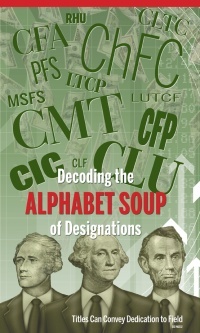Designations Proliferate for Financial Planners, Wealth Managers
by November 5, 2007 12:00 am 139 views

When it comes to what is often referred to as the “alphabet soup” of financial planning designations, one letter’s difference can mean the distinction between a person who’ll help you grow your net worth, (CFP) and someone who can help you give it away (CAP).
The jumble of letters often following a name on a business card might cause some to wonder just exactly what a CLTC, ChCF, CLF, CIMA, LUTCF, LTCP, MSFS, PFS, RHU, CLU, CSA or CASL does.
The number of designations is diverse and growing.
There are 25 designations listed on the Certified Financial Planner Web site, and 58 on the International Association of Qualified Financial Planners’ site.
Two of the most widely recognized designations are different in nature, but share the goal of providing a framework for a solid financial future.
Chartered Financial Analysts work on the portfolio management, research and analysis end of the investment spectrum, said Kerry Watkins Bradley, CFA and executive vice president and equity portfolio manager with Garrison Asset Management in Fayetteville.
Certified Financial Planners work with clients in the areas of financial planning, insurance, investments, income taxes, retirement and estate planning, said Edward Prewitt, a CFP and financial consultant with Conrad Financial Group of A.G. Edwards & Sons Inc. in Fayetteville.
The exams to become a CFA or CPA are given all over the country and the world by the CFP Board and the CFA Institute. Part of the programs’ appeal is that they are standard, said James Bell, CFA and vice president and assistant portfolio manager with Garrison, which has 270 clients and manages $205 million.
The exams are also rigorous, with pass rates in the 40 percent to 50 percent range.
“I was a finance major in college and it was like having every test I’d taken, all at once,” Watkins said of the CFA exams.
A bachelor’s degree is a prerequisite for either designation, and planners must have several years of experience in the financial planning field, as well. Designees must also pay dues and adhere to codes of conduct and standards established by their governing bodies as well.
The coursework for CFA certification includes three exams requiring 250 hours of study each. The CFP course can take a year to 18 months to study for. Prewitt studied intensively and finished in about nine months, he said.
The exam takes two days, with a four-hour session the first day and two three-hour sessions the next. Prewitt spent more than $2,000 on materials and about $600 for the exam fee.
The return on investment for Prewitt’s designation isn’t something that’s directly quantifiable, he said. But since he earned it, several clients and referrals told him they appreciated that he was a CFP.
Program requirements dictate that CFPs must renew their certification every two years, including a $360 fee and 30 hours of continuing education in subjects such as estate planning and mergers and acquisitions.
Candidates for CFA certification can expect to spend about $2,938 for the February 2008 exams, and the price goes up to $3,255 for the March 2008 exams. These prices include the cost of the curriculum materials, which are not mandatory, but are strongly advised.
